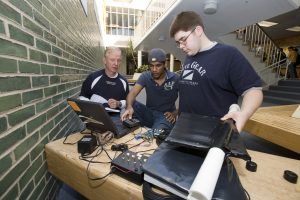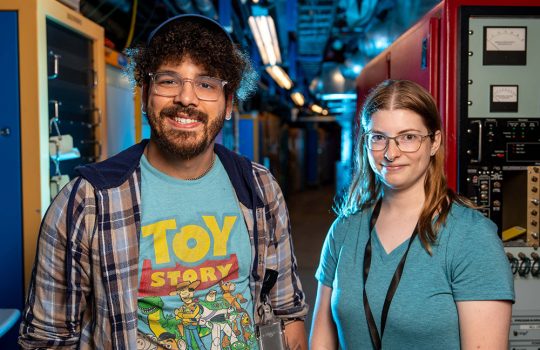
The University of Notre Dame has received a five-year, $6.1 million award from the National Science Foundation to support the nationwide QuarkNet program, which has inspired teachers and students alike for 15 years.
The University of Notre Dame has received a five-year, $6.1 million award from the National Science Foundation to support the nationwide QuarkNet program, which has inspired teachers and students alike for 15 years.
Fermi National Accelerator Laboratory plays a leading role in managing the QuarkNet program, which receives additional funding from the U.S. Department of Energy. QuarkNet uses particle physics experiments to provide valuable research, training, and mentorship opportunities for high school teachers. More than 500 teachers across the United States participate in the program.
Through the QuarkNet program, physicists at Fermilab, Notre Dame and 50 other research institutions will continue to mentor teachers in research experiences, enabling them to teach the basic concepts of introductory physics in a context that high school students find exciting. Faculty, teachers and their students work together as a community of researchers, which not only develops scientific literacy in students, but also attracts young students to careers in science and technology.
“The Notre Dame QuarkNet Center is a great example of the mentoring and training provided by particle physicists at universities and national laboratories across the country,” said Mitchell Wayne, Notre Dame professor of physics and principal investigator of the NSF grant. “It has become a focal point for educational outreach into our community.”
Fermilab and Notre Dame were two of the initial QuarkNet centers. Marge Bardeen, head of the Fermilab Education Office, started the Fermilab center 15 years ago. Her vision was to inspire and educate high school students who would be interested and engaged in particle physics. To reach these students meant reaching out to their teachers and engaging them in research.
“Fermilab and other research institutions can provide an experience that teachers and their students cannot find in other places,” Bardeen said. “They can help develop a broader framework for science. They can show how physicists discover new knowledge and talk about their work.”
One key feature of QuarkNet is the summer research experiences that participating centers offer for teachers and their students. During its first year, each QuarkNet center provides two teachers with eight-week research appointments and develops their expertise as lead teachers. In following years, each center may choose to host a teacher-student team for a research experience. This summer, for example, two teachers and eight students worked on seven different projects with Fermilab scientists, including investigations into dark matter and dark energy.
In the past few years, the reach of QuarkNet has become international, with QuarkNet activities such as cosmic-ray studies and masterclasses now available to teachers and their students around the world. This year, students in twenty-five countries are participating in the International Masterclasses, coordinated by the International Particle Physics Outreach Group. Held at university and laboratory centers, masterclasses are institutes for teams of students who become physicists for a day, analyze real experimental data and discuss results through videoconferences with physicists and peers across the world.
“They are looking at particle events, making determinations, doing counting themselves, coming to their own conclusions,” said Notre Dame’s Kenneth Cecire, who facilitates masterclasses in the United States.
Fermilab technicians have developed a cosmic-ray detector with a data acquisition system that allows high school students to conduct cosmic-ray studies in their classrooms. An e-Lab developed through an NSF grant to Fermilab allows students to upload and analyze cosmic- ray data and publish their results as online posters. QuarkNet offers professional development workshops for teachers to effectively use the detectors and e-Lab with their students. Fermilab has provided 700 cosmic-ray data acquisition systems to schools around the world, and over 1,000 teachers and 2,239 student research groups have e-Lab accounts.
As part of the QuarkNet program, teachers and their students have helped to build elements of the major Fermilab and Large Hadron Collider experiments over the last decade and are working on new detector upgrades. They are able to look at the latest scientific data from the LHC experiments, and use their own particle detectors to conduct measurements of cosmic rays.
During the next five years, the NSF grant will allow the QuarkNet program to expand and begin some new initiatives, including outreach into the Native American community.
“We are delighted to receive this new award and we are really looking forward to the next five years of QuarkNet,” Wayne said.
Fermilab is America’s premier national laboratory for particle physics research. A U.S. Department of Energy Office of Science laboratory, Fermilab is located near Chicago, Illinois, and operated under contract by the Fermi Research Alliance, LLC. Visit Fermilab’s website at http://www.fnal.gov and follow us on Twitter at @FermilabToday.
The DOE Office of Science is the single largest supporter of basic research in the physical sciences in the United States, and is working to address some of the most pressing challenges of our time. For more information, please visit http://science.energy.gov.



